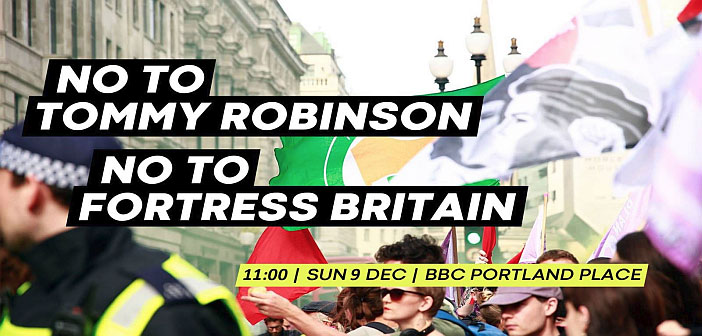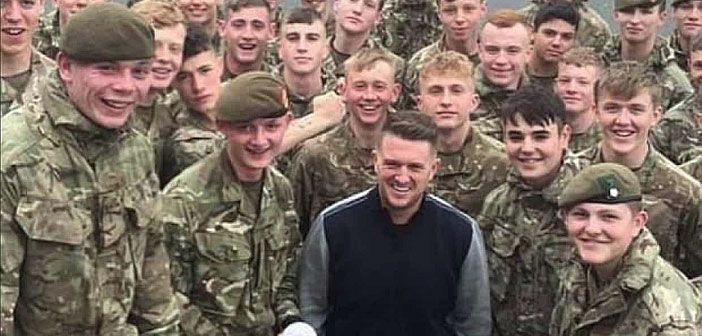Source: The Guardian
The army operates according to ideas that are recognisably of the right: submission, obedience, unaccountable power, nationalism, lethal and racialised violence.
The truth about the relationship between some smiling young infantrymen – one of whom it is reported will be discharged from the army – and far-right “patriot” Tommy Robinson is unknown, and, as a former defence journalist versed in Ministry of Defence spin, I predict that when the military gives its account the facts will be no clearer. Yet serious concerns have emerged again and again about links between the military and the far right. As a soldier, I saw open support and active membership of far-right groups. Be it involvement in Northern Irish loyalism or organisations such as the EDL, it happened when I was serving and still happens.But what does it mean? Well, it refutes the idea that the British military is somehow politically benign. The army has always been a hotbed of politics. How this happens at the top of the military is illustrated by a recent Warrior Nation report from Forces Watch, which examines how senior officers increasingly intervene in, and against, democracy. Less remarked upon is how those at the bottom are engaged politically.
Does this mean the army is now the BNP with berets? No, but in some respects, the UK military – the institution, rather than the people – is itself a far-right organisation. On one hand it is anchored to a violent colonial past that it gleefully celebrates. On the other, the army operates according to ideas that are recognisably of the right: submission, obedience, unaccountable power, nationalism, a commitment to remaking the world with lethal, racialised violence, and so on. Other visible far-right traits include a selective reading of history. The MoD’s recent marking of Black History Month celebrated soldiers, sailors and airmen of colour but failed to mention Britain’s centuries-long military domination of Indians, Africans and others.
To expect an organisation such as the British army, which encourages employees to take active pride in the past suppression of colonised peoples (my own unit was proud to have inherited a VC from Rorke’s Drift), to be compatible with values such as multiculturalism is optimistic, to say the least.
What incentive is there, we might ask, to be multiculturalist when so much military identity – for example, the battle honours embroidered on your unit’s colours – stems from the names of Indian or Afghan towns whose mutinous citizens were ravaged, robbed and raped by the “warrior” ancestors you toast at mess evenings?
What other factors could explain the interest of these young servicemen, who seemed so excited to see one of Britain’s most notorious bigots? The far right makes constant appeals to masculinity, and military men are trained to be men like no others, at least in their own minds.
But there is more to the story, if you have eyes to see it. A quick scan of their cap badges will tell you the young men in the picture are in northern English infantry regiments. In most cases the infantry are the poorest boys, recruited in a targeted way, as per MoD policy, from communities battered by decades of neoliberalism.
Having grown up in one myself, I know that these shattered communities, stripped of identity and solidarity, can be susceptible to far-right ideas. Some sympathy with ideas such as those espoused by Robinson is unsurprising.
The British military prides itself on traditions that, in 2018, serve neither the army nor the country. Tacking on a few platitudes about multiculturalism is not enough to bring those values out of the 19th century, but a mature attempt to take ownership of a vicious imperial past (and present) might help. But as ever, when it comes to it, if you want to steer working-class people – including soldiers – away from hatred, it will take a fair economic settlement that rebuilds communities and restores dignity and opportunity.
• Joe Glenton is a former defence journalist. He was a British soldier for six years. He was court-martialed in 2010, and served a nine month jail sentence, for refusing to fight in what he regarded as an unjustified war in Afghanistan.
09 December 2018 London | United Counter-Demonstration Against Fascism and Racism | Details…


